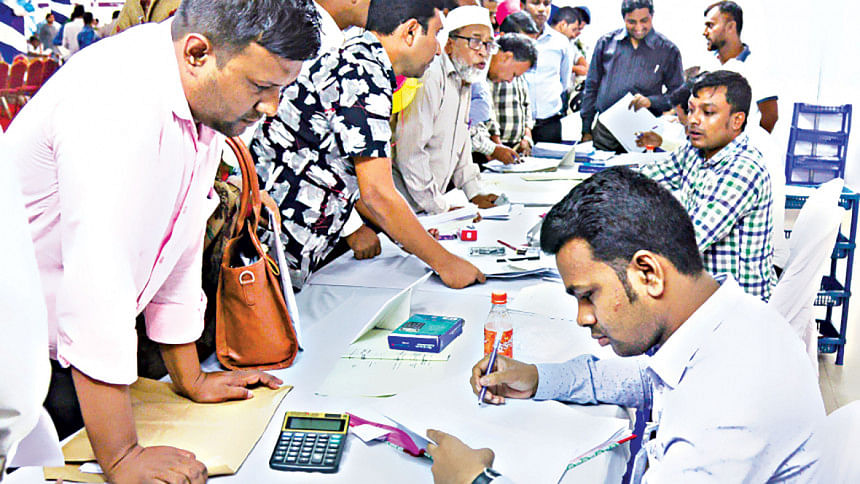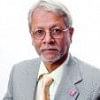Whom do the public servants serve?

Unlike the English language, where the hierarchy of age is muddled in the universality of "you," Bangla distinguishes age, endearment, and insult with the terms "tui,""tumi," and "apni"—not in that order—as do several other dialects of the subcontinent. The colonial tongue has further allowed the shrewd Bangalees to confuse both "shala" and "dulabhai" with the dualism of "brother-in-law." The recipient feels honoured, because he assumes he has been addressed as the husband of an elder sister, whereas the sly guy might have meant otherwise.
The all-encompassing "uncle" really does not do justice to four distinct relationships—mama, chacha, khalu, and fupa—in the masculine genre. Parallelly, we have mami, chachi, khala, and fupu.
Life at uncledom begins with a shock. Most of us perhaps remember the first time we were addressed so. Soon, we were upgraded to chachchu. Then came chacha, before life departed to nana or dadu cloud, just briefly pausing at nana/dada bhai. In contrast, John could live forever as an uncle.
Without delving into the idiosyncratic behaviour of a public servant that circulated in the news recently, one should ask why she lost her temper when a citizen addressed her as "apa" (sister) at her office.
In the public domain of Bangladesh, apa is the most common, respectable, perhaps the safest, and most widely accepted interpersonal address of an elder sister; the male counterpart would, of course, be bhai. Elder blood sisters and lady acquaintances, even younger ones, are addressed as apa.
Success has seemingly turned the aforementioned public servant's young head, because, according to press reports, she double-decked her arrogance by asking the service-seeking citizen to address her as ma (an affectionate term to refer to daughters in Bengali culture) instead. To qualify for that measure of paternal love from the 45-year-old man, the on-the-job BCS officer would have to be in her early 20s!
"It is normal that someone of his age would address me as his daughter. Otherwise, it shows that he has a 'bad character.' I will obviously object to a man who has one foot in his grave addressing me as 'sister,'" she said to explain her reaction (Dhaka Tribune, October 5, 2021).
Oops! Now, that's a triple deck of uncivil behaviour that should have been rectified during an officer's grooming. Training must have been overloaded with telekinetic psychiatry, if by the simple utterance of "apa," one's personality and character could be determined.
In her defence, the tone is vital in deciphering the attitude of the gentleman. Did he say "aaapu," or was it "apuuuuuu"? Otherwise, there is absolutely nothing wrong with respectfully calling a lady apa or bon (sister)—just as bhai, bhaiya, and bhaijan are more than fine.
The episode brings to light a pertinent question. How do civil servants address members of the public? Shaheb? Madam? Apa? Bhai? Did the Burichang upazila nirbahi officer (UNO) address her so-called father figure as "sir" that day? Or baba (father)? Respect has to be reciprocal, which I assume that the public officials are not taught at the training institute for the public sector, because that is common sense from Class 3.
We observe a host of special days. On the occasion of National Public Service Day in 2018, Prime Minister Sheikh Hasina had asked public servants to shun the "red tape culture" and pick the work that would be beneficial for the country and its people. The spirit of the prime minister's appeal was echoed as recently as on October 6 this year, when she "stressed the importance of good governance and asked the government officials to devote themselves to serving people to make this society a better place."
Getting upset at how one is addressed is understandable, but judging someone's reputation and abusing them are grave misdemeanours that are reflectively opposite to what the prime minister stressed when she was speaking to civil service officers. "I hope you will devote yourselves to serving people, remaining faithful to the constitutional responsibilities," she had said. Three absolute gems of words were cited: service, faithfulness, and constitution.
Somehow, government officials need to be reminded of this annually, if not monthly or more often. But why? They are some of the best sons and daughters of the soil, soaked in the blood of the martyrs and the injured, whose dignity they have solemnly vowed to uphold.
In her most recent meeting with them, Sheikh Hasina gave a stern reminder that as per the constitution, people are the owners of the country and the government employees are bound to serve the people round the clock. Is that too complicated to comprehend? Two more gems were mentioned: ownership and obligation.
The officers of state administration go through a rigorous selection process, followed by continuous training and mentoring by seniors—if they care to listen. Then why get perturbed by the sound—nay, noise—of apa?
A reasonable individual would have said in a flat pitch, without raising their voice because of their extensive education and given responsibility, "Sir/Bhai/Shaheb, it is not befitting in an office environment to call me apa in that tone" (if the man, with "one foot in his grave," had indeed dressed his address with a lecherous attitude).
Now I am not a cool person by any definition—lesser so in my younger days. I recall in shame an incident about two decades ago. At the Katabon crossing, I was hand-signalled by a traffic policeman to stop. I did, but I might have overdriven a bit due to momentum. He came rushing towards me, waving a danda in his hand. I was alone in the car, and uncontrollable. Fuming at his action, I opened the door and stepped out, but with only one foot on the road—just in case, you know. I shouted at him, "Why are you showing me your lathi?" Luckily, the police bhai was well-trained, and did not hit me. More fortunately, the light turned green.
Dr Nizamuddin Ahmed is an architect, a Commonwealth scholar and a fellow, a Baden-Powell fellow scout leader, and a Major Donor Rotarian.

 For all latest news, follow The Daily Star's Google News channel.
For all latest news, follow The Daily Star's Google News channel. 



Comments